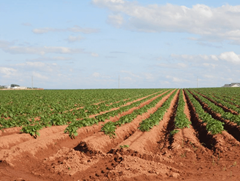 In 2013 the United Nations released a report indicating that the world’s food needs could be met through organic, local farms. The United Nations report stated that food security, poverty, gender inequality, and climate change can be addressed with a significant shift towards organic, localized farming. In contrast with industrialized farming, organic and local farms cut down on the energy and pollution that transporting food requires. Another study revealed that organic farming utilized less water than industrialized farming, as well as a general reduction in pollution related to production.
In 2013 the United Nations released a report indicating that the world’s food needs could be met through organic, local farms. The United Nations report stated that food security, poverty, gender inequality, and climate change can be addressed with a significant shift towards organic, localized farming. In contrast with industrialized farming, organic and local farms cut down on the energy and pollution that transporting food requires. Another study revealed that organic farming utilized less water than industrialized farming, as well as a general reduction in pollution related to production.
UNCTAD (United Nations Conference on Trade and Development) – the developing nations’ equivalent of OECD (Organization for Economic Co-operation and Development) – joins a rising chorus of UN agencies in its latest Trade and Environment Review. The solution for food security under climate change is a radical transformation of the agriculture and food system that would at the same time eliminate poverty, gender inequality, poor health and malnutrition. The 320 page TER – the work of 63 authors from organisations around the world – provides a coherent, closely argued case backed up by evidence from numerous case studies and surveys showing that these interrelated problems could all be solved by a paradigm shift away from the current industrial agriculture and globalized food system to a conglomerate of small, biodiverse, ecological farms around the world and a localized food system that promotes consumption of local/regional produce.
Organic Agriculture
Organic agriculture, which has gone from a fringe movement to a multibillion industry, can produce high yields and withstand disaster and duress much better than chemical-reliant crops, according to reports coming out of the International Federation of Organic Agriculture Movement (IFOAM), which held its 18th annual world congress in Istanbul this past October.
And a 30-year study from the Rodale Institute, showed that organic farm fields yielded 33% more in drought years compared with chemically managed ones.
In an article titled “Yes Organic Food Can Feed the world,” Anna Lappe, author and educator, known for her work as an expert on food systems, writes that “organic agriculture is taking off around the world, especially where it’s needed most.”
She reports that 80% of all organic producers are based in developing countries, with India, Uganda, Mexico and Tanzania leading the charge. To date, 162 nations are now home to certified organic farms, and in 2012, the 37.5 million hectares of farmland produced a harvest worth $63.8 billion.
Paradigm Shift
Food security, poverty, gender inequality and climate change can all be addressed if we adopt a significant paradigm shift, according to the UN’s Trade and Environment Review (TER), a 320-page report written by 63 authors from organizations around the world. They provide evidence with numerous coherent case studies and surveys.
The solution to all these interrelated problems is establishing a conglomerate of small, bio-diverse, ecological farms around the world and a localized food system that promotes consumption of local/regional produce.
What is standing in our way from local, organic farming? Unfortunately global trade agreements prevent much change from occurring. Trade agreements, such as the proposed Transatlantic Trade and Investment Partnership (TTIP) which is currently under negotiation, benefit large corporations such as Monsanto and further encourage corporate growth and greed.
TTIP
The Transatlantic Trade and Investment Partnership (TTIP) is a controversial series of trade negotiations currently being negotiated in secret between the European Commission and the US government in the name of so-called “free trade.” TTIP has only corporations’ best interests in mind. And if it passes, corporations will literally be able to sue governments if and when they attempt to protect their citizens or our environment. Not only does TTIP threaten our food supply and environment, but public services, workers’ rights, and online privacy as well. A story in The Independent outlines six reasons why TTIP should scare you. Or check out this TTIP infographic from Action for Solidarity Environment Equality and Diversity.
Unfortunately, we have no direct say on whether TTIP goes through or not. All we can do is get educated, tell as many people as possible and demand transparency.
Sources:
projectcensored.org; February 23, 2015; http://tiny.cc/jssixx)
Maryam Henein, “United Nations Calls for an End to Industrialized Farming.” Truth-Out. November 26, 2014, http://www.truth-out.org/opinion/item/27636-united-nations-calls-for-an-end-to-industrialized-farming.
http://www.i-sis.org.uk/Paradigm_Shift_Urgently_Needed_in_Agriculture.php
UNCTAD. Wake up Before it is Too Late, Make Agriculture Truly Sustainable Now for Food Security in a Changing Climate, Trade and Environment Review 2013, pp. 19-21, UNCTAD, Geneva, 2013.
Ho MW, Burcher S, Lim LC, et al. Food Futures Now, Organic*Sustainable*Fossil Fuel Free, ISIS/TWN, London/Penang, 2008, http://www.i-sis.org.uk/foodFutures.php
